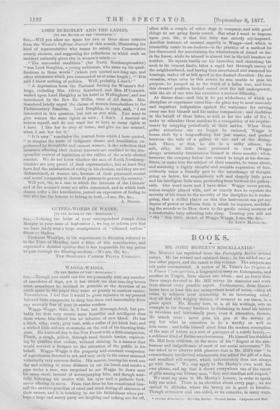LORD BURGHLEY AND. THE LADIES.
[To THE EDITOR OF THE "SPICOTATOR.1 SIR,—Will you allow me space for two or three short extracts from the TVomen's Suffrage Journal of this month, illustrating the kind of representative who seems to satisfy our Conservative county electors, and suggesting the reflections to which such an incident naturally gives rise in women's minds :— " The successful candidate" (for North Northamptonshire) "was Lord Burghley, a young nobleman, who sums up his quali- fications in these words" [which you quoted not long ago, and other utterances which you commented on at some length], 4( It is said 1 know nothing of politics. Well, probably I don't.'" "A deputation from the National Society for Women's Suf- frage, including Mrs. Oliver Scatcherd and Mrs. M'Cormick, waited upon Lord Burghley at his hotel in Wellingboro', and was introduced by the Rev. Mr. Willis, vicar of All Saints. Mrs. Scatcherd briefly urged the claims of women-householders to the Parliamentary franchise. Lord Burghley, in reply, said, "I am interested in this question, but not as you wish. You want to give women the same rights as men ; I don't. I married an heiress myself, and do not want her to have as many rights as I have. I like her to stop at home, and give me her counsel, when I ask her for it."
"It is easy," concludes the journal from which 1 have quoted, "to imagine the sense of indignant shame and humiliation ex- perienced by thoughtful and earnest women, in the reflection that measures affecting their dearest interests are confided to the irre- sponsible control of legislators of the calibre of the newly-elected senator. We do not know whether the men of North Northamp- tonshire are very proud of their representative, but at least they have had the satisfaction of voting in his election, and they are not disfranchised, as women are, because of their presumed mental and moral incapacity to choose fit persons to govern the country."
Will you, Sir, in a case in which the interests of the Liberals' and of the women's cause are alike concerned, and in which both classes suffer a like humiliation, permit an expression of feeling to one who has the honour to belong to both.—I am, Sir, &c., A. SHORE.






























 Previous page
Previous page